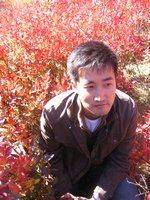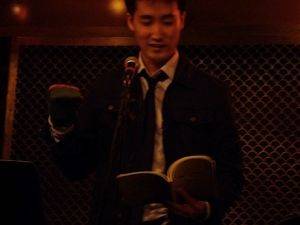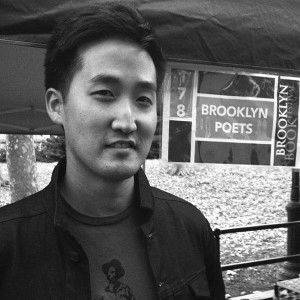As part of our coverage of Eastern Illinois University’s Lions in Winter literary event, our own Nina Samii-Frye interviewed Dr. Jason Koo. Here’s their conversation.
———
Smile Politely: Do you ever draw from your experiences as a professor when writing a poem? What do you believe is the most poetic aspect of teaching?
 Jason Koo: Not often, but yes. The last poem in my new book, “Work,” draws upon my experiences teaching composition a few years ago at Lehman College of the City University of New York. It explores how the kinds of work I do–writing poetry and teaching writing–are odd kinds of work, involving a “particular” kind of pain–the poem riffs off the word “particularly”–or perhaps I should say the pain of particularity. This is compared to the work my cat does–sleep–and the work my girlfriend does, teaching yoga, which both seem more immediately pleasurable. I would say the most “poetic” aspect of teaching–though I usually only use that adjective pejoratively–is that you can inspire people and change their ways of looking at the world through words. This is why I enjoy teaching: it feels like a natural extension of my “poetic” self.
Jason Koo: Not often, but yes. The last poem in my new book, “Work,” draws upon my experiences teaching composition a few years ago at Lehman College of the City University of New York. It explores how the kinds of work I do–writing poetry and teaching writing–are odd kinds of work, involving a “particular” kind of pain–the poem riffs off the word “particularly”–or perhaps I should say the pain of particularity. This is compared to the work my cat does–sleep–and the work my girlfriend does, teaching yoga, which both seem more immediately pleasurable. I would say the most “poetic” aspect of teaching–though I usually only use that adjective pejoratively–is that you can inspire people and change their ways of looking at the world through words. This is why I enjoy teaching: it feels like a natural extension of my “poetic” self.
SP: You often write about light: how it is fresh in the morning, how it streams through the window as you eat a tuna sandwich, how you “read” it as it falls across objects in a room. Why do you seem to take light’s appearance so personally?
Koo: Well, doesn’t everyone? Or shouldn’t everyone? I would say if you’re not taking light personally, you’re not really living. Which of course is true of us most of the time — we’re usually about 85% asleep. One reason to write a poem, or read a poem, or look at a painting, or watch a film, or look at a beautiful building, or walk through one, is to notice the light. This is the life source. Many times in poems I am writing as a way of becoming conscious of the light around me, which leads to greater consciousness of my life and the world. I would say that I still do not write about light enough. Read Emerson or Louis Kahn–the Emerson of architecture–and you’re flooded with light in every sentence.
SP: A common cliche is that one should focus on the journey, not the destination. However, your poem about traveling and temporary lodging make the journey seem awfully unpleasant. Do you think it’s more important to focus on a journey or the destination? Why?
Koo: I would say that poem’s not really about the journey. Or the destination. I would say it’s about stasis–motels are purgatorial spaces, middle grounds where you’re adrift, neither on a journey nor at a destination. That said, the fun of that poem is the journey from one purgatorial space to another via the passport of different online motel reviews I used as fodder for the poem. Overall, the speaker of Man on Extremely Small Island is trying to burst out of different purgatorial spaces–his apartment, motels, airports, etc–into more open spaces, but one of the ironies is how even the open road in America becomes its own kind of purgatorial space. Your last question is a bit tricky because of course as a poet I would say the journey is more important than the destination, but I would also say that you can’t really enjoy the journey unless you have some sense of destination. I think a completely open road, just like a completely open poem, is ultimately debilitating.
SP: When you write, do you sit down and try to complete a draft, or do you write down lines as they come to you and then put them together? What is your writing process like?
 Koo: I’ve talked about this at length in other interviews, so I’ll spare you my ultra-obsessive i.e. terrifying answer and say that I almost never complete a draft in one sitting, though it depends on the type of poem. My poems, as I’m sure you’ve noticed, tend toward more epic, narrative spaces — I say “epic” as the opposite of “lyric,” not because I think I’m Homer. So when I’m building a longer poem I don’t like to rush it; rushing poems in the past has prevented me from including as much as I could have, making potentially big poems smaller. But sometimes I’m in a more lyric mind frame–say, for poems like “Swearing by Effingham” and “There Is No There, There” — and I do like to get the whole shape of the poem down in one draft. There’s something about the energy of a lyric moment that you have to capture; if you wait too long you might lose it. But I’ll still go back and work on that poem every morning for the next week or two weeks or three weeks or however long it takes until I think it’s exactly right, and then I’ll show it to some readers and see what they say and if they come up with a way of making it better I’ll work on it some more. I have a pretty methodical process; I never just jot down lines and compile them into a poem later, though I will go back through my notebooks and find phrases and sentences that I think would make good lines for poems. Again, I have to have a sense of the “destination” before I start — that’s what makes the journey fun, what gives me energy and focus for the journey.
Koo: I’ve talked about this at length in other interviews, so I’ll spare you my ultra-obsessive i.e. terrifying answer and say that I almost never complete a draft in one sitting, though it depends on the type of poem. My poems, as I’m sure you’ve noticed, tend toward more epic, narrative spaces — I say “epic” as the opposite of “lyric,” not because I think I’m Homer. So when I’m building a longer poem I don’t like to rush it; rushing poems in the past has prevented me from including as much as I could have, making potentially big poems smaller. But sometimes I’m in a more lyric mind frame–say, for poems like “Swearing by Effingham” and “There Is No There, There” — and I do like to get the whole shape of the poem down in one draft. There’s something about the energy of a lyric moment that you have to capture; if you wait too long you might lose it. But I’ll still go back and work on that poem every morning for the next week or two weeks or three weeks or however long it takes until I think it’s exactly right, and then I’ll show it to some readers and see what they say and if they come up with a way of making it better I’ll work on it some more. I have a pretty methodical process; I never just jot down lines and compile them into a poem later, though I will go back through my notebooks and find phrases and sentences that I think would make good lines for poems. Again, I have to have a sense of the “destination” before I start — that’s what makes the journey fun, what gives me energy and focus for the journey.
SP: In music, the power often comes from the chorus and the verses are somewhat secondary. In your poetry, the power is up front. Do you prefer this over a slow build? Why?
Koo: Not really sure what you mean by “power,” though I have my own sense of this. I’m surprised by your question because I actually think my poems do build slowly — the crescendo usually comes at the end. I like to start with a bang, too, but if you ended most of my poems after a stanza or two, you would not feel their whole “power.” Think of the ending of “Man on Extremely Small Island” or the Game 7 poem or “After Chicago” or “Poem with a Hippo in It” — they all build to a climax at the end. I use long sentences to develop the “slow build” you mention; many of poems are all one sentence. So again, I’m surprised by your question. Incidentally, “power” is one of the big themes of my new book, America’s Favorite Poem, whose epigraph is taken from Kanye West’s song “Power.” So maybe you’re just seeing all that in your crystal ball.








